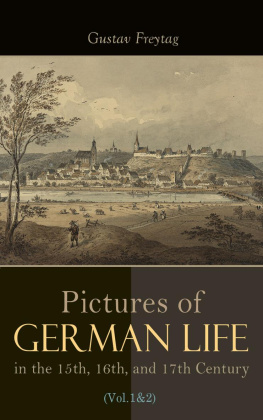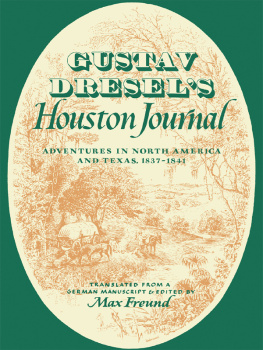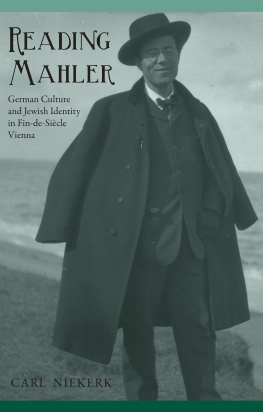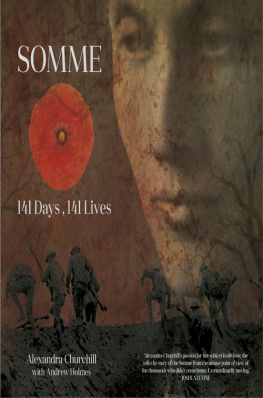INTRODUCTION.
Table of Contents
In vain does the German seek for "the good old times." If even the pious zealot who condemns Hegel and Humboldt as the greatest of Atheists, or the conservative proprietor who is struggling for the privileges of his order, were to be thrown back into one of the last centuries, he would feel first unmitigated astonishment, then horror, at the position in which he would find himself placed. What now appears to him so desirable would make him miserable, and he would be driven to despair at the loss of all the advantages of that civilization which he at present so little appreciates.
Let a German proprietor endeavour to realize to himself the position of one of his ancestors in the year 1559. Instead of the house he has now, built in the old German style, surrounded by its English pleasure-grounds, he would find himself shut up in a gloomy, dirty, and comfortless building, placed either on a height destitute of water, and exposed to the cutting blasts of the wind, or else surrounded by the ftid smells of stagnant ditches. It is true that three generations back dim panes had been added to the small windows, and large stoves of Dutch tiles, which were fed with logs from the neighbouring forest, kept the cold out of the sitting-rooms; but the accommodation was limited, as it was occasionally necessary to defend the house against attacks from the citizens of the nearest town, roving bands of marauders, or reckless soldiers bent on revenge because they had been cheated of half their pay by the neighbouring prince.
Comfortless and dirty is the house, for it is occupied by many others beside the family of the owner: younger brothers and cousins, with their wives and children, numberless servants, amongst them many of doubtful character, men-at-arms, labourers, and in 1559, mercenaries, may be added. In the court-yard, from the dung-heap is heard the cry of children quarrelling, and from round the kitchen fire the no less inharmonious sound of wrangling women. The children of the house grow up amongst horses, dogs, and servants; they receive scanty instruction in the village school; the boys keep the geese and poultry for their mother, or they go with the village people to the wood to collect wild pears and mushrooms, which are dried for the winter meal; the lady of the castle is housekeeper, head cook, and doctor of the establishment, and is well accustomed to intercourse with lawless men and to the ill-treatment of her drunken husband. She is faithful, a thorough manager, proud of her escutcheon, of the gold chains and brocades belonging to the family; she looks suspiciously on the dress and finery of the wives of the counsellors of the town, who she considers have no right to wear sable and ermine, velvet dresses, pearls in their hair, and precious stones round their necks. The love and tenderness of her nature frequently gave elevation to her countenance and manners; but in those days, both in the homes of the nobles and in the courts of princes, much was considered decorous and was permitted to women of the highest character in familiar conversation which now would be condemned as unseemly in the wife of a common labourer.
The daily life of the landed proprietor is one of idleness or wild excitement. The hunting is certainly excellent. Where the forest has not been laid waste by the reckless stroke of the axe, grow the stately trees of the primeval wood; the howl of the wolf is still heard in the winter nights; the hunters sally forth on horseback, with spear and cross-bow, against beasts of prey, stags, roedeer, and the wild boar, and all adopt the habits of the rough hunters. But whilst hunting, even in his own wood, every one must be provided with weapons against other foes than the wolf and the boar. There are few hunting-grounds concerning which there is not some quarrel with a neighbour or feudal lord, who often claims the right of following the chase up to the squire's castle; the squire is also set at defiance by the peasants of the nearest village, whose crops have been laid waste by the stag and the boar, and who hates the master of the castle for having beaten or thrown him into prison for crossing the path of the chase; and not unfrequently an arrow whistles through the darkness of the wood with other aim than a wild animal; or an armed band breaks through a clearing, and then begins a race for freedom and life. We will suppose the game to be brought home and cut up in the castle yard; then follows the banquet, with endless drinking of healths and wild revelry, and seldom a night passes without the whole party breaking up in a state of intoxication. Drunkenness was at this time a national evil, prostrating alike the powers of princes, nobles, and people. The guests at the hunt and the banquet are of the same rank as their host--some are old cavaliers, constantly swearing, and relating anecdotes of the knightly feats they have performed in the greenwood against the traders and townspeople; others a younger race, hangers-on of the great feudal lords, who proudly wear the gold-laced caps given by these lords to their vassals.
Thus the week passes away. On Sunday it is considered a duty to attend the village church, and listen to the preacher's endless sermon, which generally breathes hatred to Calvinists or Papists, and denounces the factious Schwenkfeld or the apostate Melancthon. There is but little intercourse with foreign countries: the country gentleman gratifies his curiosity by buying from the itinerant pedler what was then called a newspaper, being a few quarto sheets published at intervals in the towns, containing very doubtful intelligence, such as a horrible fight having taken place between the sons of the Turkish sultan, a young maiden being possessed by the devil, or the French king having been struck on the head by one of his nobles. Sometimes the young squire listens to the songs of ballad singers, who recite similar news to old popular tunes, or, what is still more welcome, satirical verses on some neighbour, which the singer has been paid to propagate far and wide through the country. The reading which gives most pleasure at home, is either some astrological absurdity, such as a prophecy of old Wilhelm Friese or Gottfried Phyllers, or a description of the funeral festival of the Emperor Charles V. at Augsburg; besides these, theological writings find their way into the castle.
This life, which in spite of all its excitement is so meagre and monotonous, is sometimes varied by the discovery of a murdered man in the fields, or by some old woman of the village being accused of witchcraft. These incidents give rise to judicial proceedings, in the first case tardy and of little interest, in the latter fierce and bloodthirsty.
There are other annoyances in these times from which the landed proprietor is seldom free,--lawsuits and many difficulties. His father had sought to obtain money for the payment of his debts on the highway in his breastplate and saddle, and thus revenged himself for his injured rights. But now a new age has begun, and law asserts its supremacy over the self-will and independence of individuals; it is however an uncertain, dilatory, distorted law, which overlooks the powerful, and too often favours the wealthy. The young squire still rides his charger, armed with lance and pistol, but he is no longer eager to obtain fame and booty in war. The foot-soldier with pike and musket, and light-horseman of the town have outstripped him. Even at the tournament he prefers running at the ring; and if perchance he should encounter in the lists any person of distinction, he finds it more advantageous to allow himself to be unhorsed, than to contend manfully.













